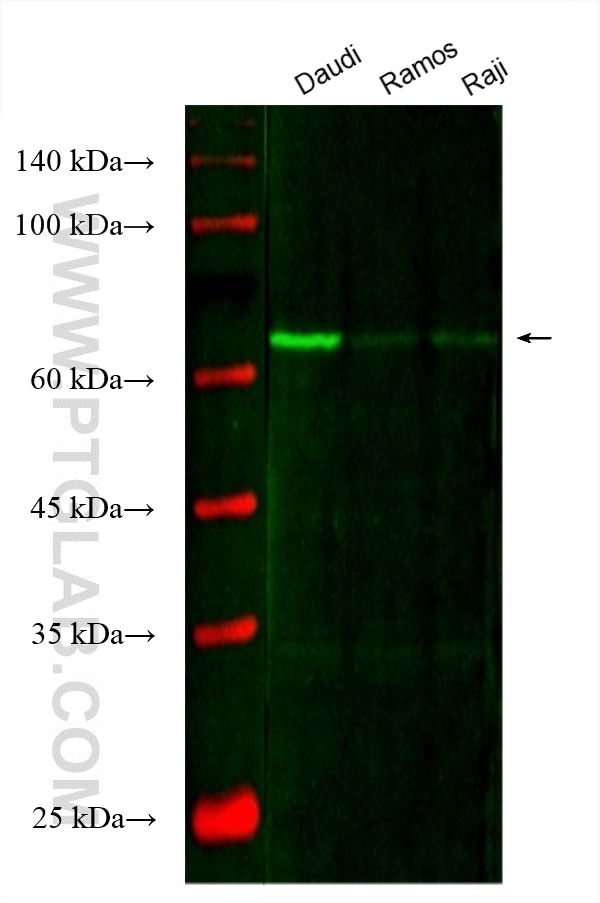Validation Data Gallery
Tested Applications
| Positive WB detected in | Daudi cells, Ramos cells, Raji cells |
Recommended dilution
| Application | Dilution |
|---|---|
| Western Blot (WB) | WB : 1:500-1:1000 |
| It is recommended that this reagent should be titrated in each testing system to obtain optimal results. | |
| Sample-dependent, Check data in validation data gallery. | |
Product Information
CL488-66721 targets SYK in WB applications and shows reactivity with Human samples.
| Tested Reactivity | Human |
| Host / Isotype | Mouse / IgG2b |
| Class | Monoclonal |
| Type | Antibody |
| Immunogen |
CatNo: Ag17654 Product name: Recombinant human SYK protein Source: e coli.-derived, PET28a Tag: 6*His Domain: 239-427 aa of BC001645 Sequence: QLVEHYSYKADGLLRVLTVPCQKIGTQGNVNFGGRPQLPGSHPATWSAGGIISRIKSYSFPKPGHRKSSPAQGNRQESTVSFNPYEPELAPWAADKGPQREALPMDTEVYESPYADPEEIRPKEVYLDRKLLTLEDKELGSGNFGTVKKGYYQMKKVVKTVAVKILKNEANDPALKDELLAEANVMQQL 相同性解析による交差性が予測される生物種 |
| Full Name | spleen tyrosine kinase |
| Calculated molecular weight | 635 aa, 72 kDa |
| Observed molecular weight | 70-75 kDa |
| GenBank accession number | BC001645 |
| Gene Symbol | SYK |
| Gene ID (NCBI) | 6850 |
| ENSEMBL Gene ID | ENSG00000165025 |
| RRID | AB_3084268 |
| Conjugate | CoraLite® Plus 488 Fluorescent Dye |
| Excitation/Emission maxima wavelengths | 493 nm / 522 nm |
| Form | |
| Form | Liquid |
| Purification Method | Protein A purification |
| UNIPROT ID | P43405 |
| Storage Buffer | PBS with 50% glycerol, 0.05% Proclin300, 0.5% BSA{{ptg:BufferTemp}}7.3 |
| Storage Conditions | Store at -20°C. Avoid exposure to light. Stable for one year after shipment. Aliquoting is unnecessary for -20oC storage. |
Background Information
SYK(spleen tyrosine kinase) is a key regulator of signal transduction events,apoptosis and orderly cell cycle progression in B-lineage lymphoid cells. Although SYK has not been linked to a human disease, defective expression of the closely related T-cell tyrosine kinase ZAP-70 has been associated with severe combined immunodeficiency(PMID:11494125). This protein has 2 isoforms produced by alternative splicing.
Protocols
| Product Specific Protocols | |
|---|---|
| WB protocol for CL Plus 488 SYK antibody CL488-66721 | Download protocol |
| Standard Protocols | |
|---|---|
| Click here to view our Standard Protocols |

